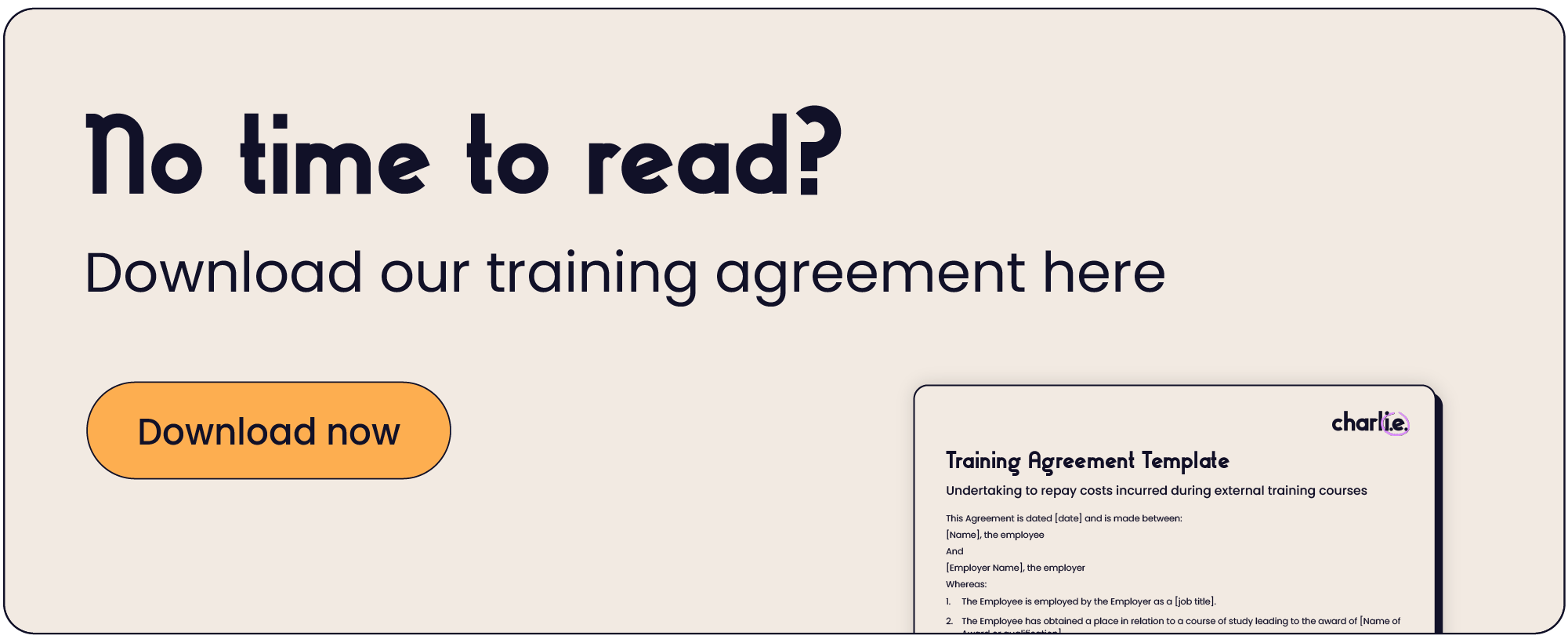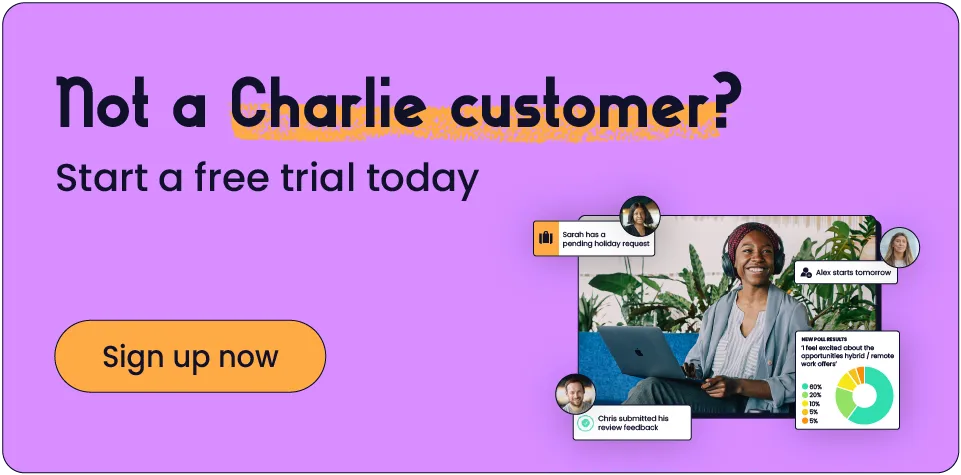How to use a training agreement (including a free template)

If you're running a small business, helping your team to grow and develop is crucial – but you also have to make sure that any investment you make in your team is protected. This is where a training agreement can help. In this post, we'll show you exactly how to use a training agreement as well as provide you with a free, professionally-written training agreement template.
What is a training agreement?
A training agreement is a written agreement between an employer and their employee setting out the conditions of any training the company pays for them to take.
It will set out:
- how much the training costs
- who is providing the training
- who is responsible for paying for it in the first instance.
But importantly for employers, it can also be used to set out when an employee might become responsible for repaying any of those training costs, as well as how that repayment would work. In particular, it can define whether those costs become repayable should an employee leave the business soon after completing the training.
Why should my company use a training agreement?
If you’re working at a small business, then allowing your team to develop is absolutely essential.
Let’s not forget – the success of your company hangs upon the people who run it. If there is a chance to help them become better at their jobs, then it makes sense to take it.
What’s more, a strong emphasis on Learning and Development can help drive up levels of employee engagement and employee retention.
However, in some situations, small companies also have to protect the investments they make in their staff and follow HR compliance procedures. L&D doesn’t always cost the earth, but certain courses or professional qualifications can be very expensive – if an employee ends up leaving your business soon after they completed a training course your company paid for, then it could leave you seriously out of pocket.
Not only might your company fail to benefit from the training it has paid for in the short term, but it could also end up paying for that same training again when they hire a replacement. Factor in the sunk cost inherent in any hiring process and you can see how this could potentially leave a small business in a really difficult position.
This is where a training repayment agreement comes in – it’s a way for companies to ensure they don’t lose out financially when paying to develop their employees. It's as essential as any employment contract.
How should I use a training agreement?
Before sending their team out to complete any training, many companies ask their employees to sign a training agreement that makes it their responsibility to repay any investment in their training should they leave before a certain length of time.
This could work in a number of different ways:
- Some training agreements operate on a kind of sliding scale, where the longer the employee stays with the business the less they are due to repay when they decide to move on.
- At other companies, the training agreement is a bit more black and white, with a specific cut-off point dictating when the employee stops being responsible for the repayments.
- If the cost of the course is relatively low, then the training agreement could come out of the employee’s final salary. If it’s more expensive, employers could put in place a more structured payment plan.
Want to find out more about HR compliance? Check out our HR compliance checklist.
What should I know before putting together a training agreement?
Done properly, training agreements are a perfectly legal and proper way for businesses to financially protect themselves. However, if you do decide to put one in place, there are a couple of things to look out for.
Training agreements and UK employment law
Done properly, training agreements in the UK are a perfectly legal and proper way for businesses to financially protect themselves. However, if you do decide to put one in place, there are a couple of things to look out for.
Training agreements cannot constitute a ‘penalty clause’
The purpose of training agreements in the UK is to protect companies from losing out when they invest in their team. It’s not intended to be a tactic for discouraging people from quitting. For that reason, the amount of money the training agreement seeks to recoup must be a reasonable estimate of the money the company has lost.
Let's take a look at a training agreement example in action. If a company is to spend £1,000 on a training course but the employee resigned the day after the course finished, then asking for the employee to repay the £1,000 as part of a training agreement would be fair and reasonable.
But if that employee stayed on for two years after completing the course, making use of that training every day, then £2,000 is not a reasonable estimate of the money the company has really lost. In this case, using a training agreement to try and recoup the full £2,000 wouldn’t be reasonable – and most likely wouldn’t pass muster legally.
However, if the training agreement is properly drafted then the employer could reasonably be expected to recoup a certain proportion of the £2,000.
Training agreements cannot constitute ‘restraint of trade’
The second thing to think about when using training agreements is the idea of ‘restraint of trade’. As we already mentioned, training agreements are designed to protect businesses from losing out on their investments – but the law won’t allow an employer to use them to unreasonably prevent someone from changing jobs.
If a training agreement has the practical effect of ‘trapping’ an employee in their current role, then it may well be found to be unenforceable.
Again, getting this balance right comes down to the wording of the training agreement in the first instance.
To help you, our qualified HR advisors have put together a free training agreement template that you can download right here.
Occasionally, a simple template won’t be enough. If for example you’d like to add extra layers of protection for your business but lack the knowledge to have a go at it alone, it can be a difficult problem to tackle.
That’s where our HR advisors can come in to help. With over 20 years of combined experience, they can draft a bespoke training agreement for your business that leaves no room for legal loopholes.
But if you prefer using our template, for now, don't forget to download it by clicking right here.
Training agreements are not enough
As important as protecting your business legally and financially is, your team members’ learning and development have to be put on the same level.
Your role is to highlight the steps you’re taking to promote their growth before getting them to sign a training agreement – value transparency and avoid putting them off by simply caring about what’s best for the business.
Along with your training agreement, think about:
- Putting effective performance reviews into place so your team members get the space they need to discuss progress with their managers.
- Rolling out a career progression framework that will help your team members get a clear idea of how they can evolve within the company and what steps they can take to get there.
- Providing a sufficient L&D budget for each team member so everyone gets equal opportunities to develop their skills and feel confident in their role.
This might seem like a lot, especially when you’ve got no HR knowledge to make it happen, but you don’t have to do it all by yourself.
With HR software like Charlie, you can get the HR foundations your business needs to thrive – time off management, onboarding, performance reviews and more – giving you more time to focus on L&D.




